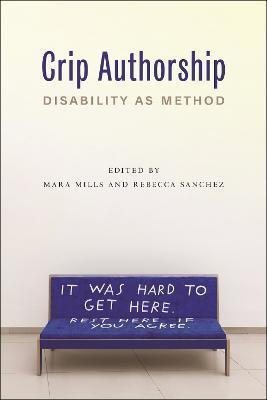Crip Authorship: Disability as Method

Crip Authorship: Disability as Method
Starting from the premise that disability is plural and authorship is an ongoing project, this collection of thirty-five compact essays asks how knowledge about disability is produced and shared in disability studies. Crip authorship takes place within and beyond the commodity version of authorship, in books, on social media, and in creative works that will never be published. Crip authorship celebrates people, experiences, and methods that have been obscured; it also involves protest and dismantling. It can mean innovating around accessibility or attending to the false starts, dead ends, and failures resulting from mis-fit and oppression. The chapters draw on the expertise of international researchers and activists in the humanities, social sciences, education, arts, and design. Across five sections--Writing, Research, Genre/Form, Publishing, Media--contributors consider disability as method for creative work: practices of writing and other forms of composition; research methods and collaboration; crip aesthetics; media formats and hacks; and the capital, access, legal standing, and care networks required to publish. Designed to be accessible and engaging for students, Crip Authorship also provides theoretically sophisticated arguments in a condensed form that will make the text a key resource for disability studies scholars. Essays include Mel Y Chen on the temporality of writing with chronic illness; Remi Yergeau on perseveration; La Marr Jurelle Bruce on mad Black writing; Alison Kafer on the reliance of the manifesto genre on conceptualizations of disability; Jaipreet Virdi on public scholarship for disability justice; Ellen Samuels on the importance of disability and illness to autotheory; Xuan Thuy Nguyen on decolonial research methods for disability studies; Emily Lim Rogers on virtual ethnography; Cameron Awkward-Rich on depression and trans reading methods; Robert McRuer on crip theory in translation; Kelsie Acton on plain language writing; and Georgina Kleege on description as an access technique.
PRP: 343.58 Lei
Acesta este Prețul Recomandat de Producător. Prețul de vânzare al produsului este afișat mai jos.
309.22Lei
309.22Lei
343.58 LeiLivrare in 2-4 saptamani
Descrierea produsului
Starting from the premise that disability is plural and authorship is an ongoing project, this collection of thirty-five compact essays asks how knowledge about disability is produced and shared in disability studies. Crip authorship takes place within and beyond the commodity version of authorship, in books, on social media, and in creative works that will never be published. Crip authorship celebrates people, experiences, and methods that have been obscured; it also involves protest and dismantling. It can mean innovating around accessibility or attending to the false starts, dead ends, and failures resulting from mis-fit and oppression. The chapters draw on the expertise of international researchers and activists in the humanities, social sciences, education, arts, and design. Across five sections--Writing, Research, Genre/Form, Publishing, Media--contributors consider disability as method for creative work: practices of writing and other forms of composition; research methods and collaboration; crip aesthetics; media formats and hacks; and the capital, access, legal standing, and care networks required to publish. Designed to be accessible and engaging for students, Crip Authorship also provides theoretically sophisticated arguments in a condensed form that will make the text a key resource for disability studies scholars. Essays include Mel Y Chen on the temporality of writing with chronic illness; Remi Yergeau on perseveration; La Marr Jurelle Bruce on mad Black writing; Alison Kafer on the reliance of the manifesto genre on conceptualizations of disability; Jaipreet Virdi on public scholarship for disability justice; Ellen Samuels on the importance of disability and illness to autotheory; Xuan Thuy Nguyen on decolonial research methods for disability studies; Emily Lim Rogers on virtual ethnography; Cameron Awkward-Rich on depression and trans reading methods; Robert McRuer on crip theory in translation; Kelsie Acton on plain language writing; and Georgina Kleege on description as an access technique.
Detaliile produsului











